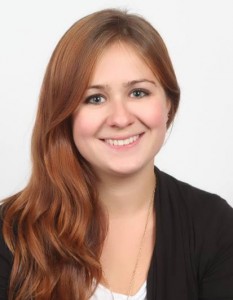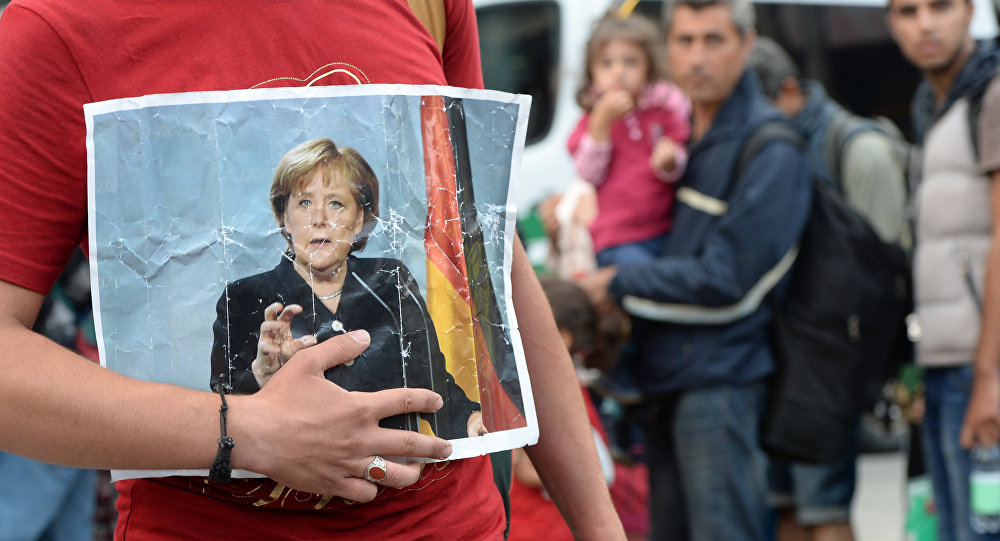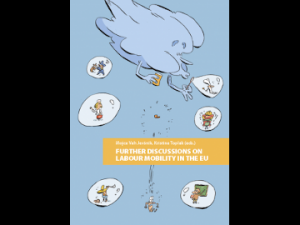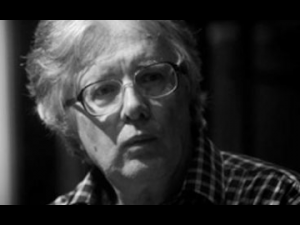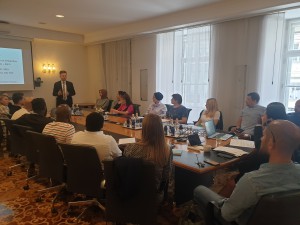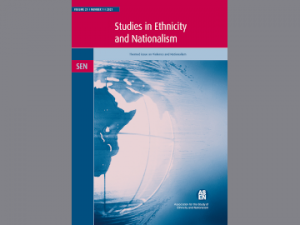Begunci v Nemčiji
19. 4. 2018 | Človekove pravice in manjšine
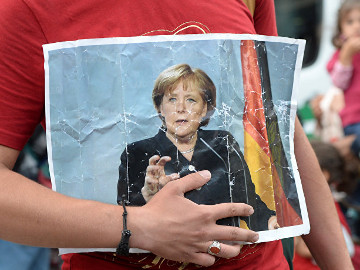
When thinking about the so called »refugee crisis« starting 2015, German chancellor Angela Merkel immediately comes to mind. She has become the face of humanity and compassion, praised by some, called naive and imprudent by others. But things are not as bright as they might seem at first glance. Like any other European country, liberal politics are facing backlashes from rising right-wing extremism and Angela Merkel is not as confident as people, especially outside of Germany, believe her to be. Fear of overcrowding, terrorism and »islamisation« is rising, with no little blame to images drawn by media that shape the discourse about refugees. In this essay I will draw attention to some outstanding events and moments of the Refugee Crisis in Germany. I will focus on three important actors that are playing a major role in shaping opinions or causing reactions and outcomes of the »refugee crisis« in Germany: Angela Merkel, the media and the rising right-wing extremists. It is not easy to find a date that sets the beginning of the refugee crisis. Many might argue that it can be aligned with the start of the civil war in Syria in 2011, since Syrians make up the biggest percentage of people seeking refuge in Germany. Considering that a large number of people also came from the Northern African region, taking on the highly dangerous travel through the Mediterranean Sea from Libya and Egypt to Italy and Greece, one could argue that it started in the beginning of 2014, when that number was drastically rising. It was around mid-2014 that the first Syrian Refugees reached Germany. Even though until mid-2015, most of the Syrians remained in neighboring countries and the North African refugees remained in Italy and Greece, the means of accommodation and support for refugees in Germany were already bursting at the end of 2014. A prognosis had been made that the Syrian and North African refugees on the move would most likely seek Germany or Sweden as their destinations, as well as calls for support to the already economically strained Italy and Greece were becoming louder. In 2017 the public debate about refugees was fading away slowly, since the number of refugees that first entered Germany (187.000) is significantly lower in comparison to around 900.000 new arrivals in 2015. The refugee crisis seemed to be over, but the general elections held in September still showed consequences: after 60 years of the CDU being the furthest right wing party in Parliament, the new far right party »Alternative fuer Deutschland (AfD)« (Alternative for Germany) became the third strongest in the German parliament, reaching 12,5 % of the votes. A lot of people blamed Merkel’s uncoordinated and unprepared approach to accepting refugees, stating that the excessive demand and chaos that was caused by it, have stirred up fear within the German population. Others said that the high media attention and the spread of rumors on media platforms were to be blamed. Debates about forming a coalition to govern were deeply shaped by disagreements about bringing together members of refugee families, upper limits to the number of Refugees in Germany and deportations. The neo-liberal Party FDP (Freie Demokratische Partei (Free Democratic Party)) was complaining about having to sit next to the members of AfD and until the beginning of 2018 the Parties were not able to form a government. While the government had initially planned to deport more refugees in 2017 the number of deportations nevertheless decreased for about 6%. This is mostly due to the great decrease in the number of refugees entering Germany. Due to the events in 2016, there has been a shift in who is getting deported: in 2017 a lot more people from the Maghreb countries had to leave. The number rose from about 300 to about 1.500 per year. Some Maghreb refugees react by throwing away their passports and pretending to be Syrians. Migration scholar Martin Zillinger criticizes that Germany has thus created a pressure that leads to people preferring to live in illegality rather than returning to their home country. Political awareness of the situation was rising, theoretical debates about distributing refugees and limitations of the number each state was willing to take in were being held by the spring of 2015, but little action was taken. Critiques, especially human rights advocates and liberal politicians, often state that the Merkel administration seemed to have been reluctant about the decision on how to handle the great number of people that were on the move to Germany, until it was too late. On 25.08.2015 finally the German Federal Agency for Migration and Refuge “Bundesamt für Migration und Flucht (BAMF)” stated they would suspend the Dublin procedure for all Syrian Refugees, meaning that the country they first arrived in would no longer be responsible for their asylum procedure and thus were highly discharging Greece, which has been the EU country were most Syrians first entered. On the 31 August, after 4 days before 71 refugees were found dead inside a Hungarian van on the Austrian highway, Angela Merkel first said the words, which quickly became her unintended slogan for Germany’s role in the refugee crisis: »Wir schaffen das!« (We can do it!) Little did she know that less than a week later, her encouraging words would already meet reality: in the night of 4 September she had to make a decision that did not just mark her career but also the unfolding of the refugee crisis in Germany. Over 2.000 refugees were being stranded at Budapest central train station, with about 1.500 more arriving every day. Most of them were Syrians that either continued their way via the so called »Western Balkan Route« after conditions for refugees in the surrounding countries like Turkey and Lebanon were becoming increasingly inhumane, or directly came from Syria. Some of them were also from Iraq or Afghanistan. The Western Balkan Route serves as a »corridor« from Turkey and Greece to the central European countries. By the beginning of September trains going from Budapest to Vienna and Munich were overcrowded, causing some people having to wait for several days until they could continue their journey. On 4 September, 2.500 refugees eventually started making their way by foot, and the Hungarian Prime Minister Viktor Orban, who is known for his conservative and restrictive anti-immigrant policy, decided to schedule buses to bring all of the stranded refugees over to the Austrian border – presenting the then Austrian Chancellor Werner Faymann with faits accomplis. Faymann then consulted Merkel and together they decided to open the borders, since holding back about 20.000 refugees at once, would have only worked with violence. To speed up the process, they both entirely set aside passport control or registration. When on 5 December the refugees finally arrived to Germany, pictures of cheering people at the Munich central station, handing refugees water and food, or toys for the children were seen all over the media. These images of the German Willkommenskultur stand in contradiction to the fact that for the night from the 4th to the 5th of September marks the date when in the public eye the mere arrival of refugees in Germany turned into a crisis. It is through this decision that Merkel, a conservative politician, became the face of the European refugee crisis, showing an allegedly liberal approach. Often nationals of other countries are surprised when told that Christdemokratische Union, CDU (Christian Democratic Union) until 2017 constituted the furthest right wing party in the parliament. The refugees in Germany see her as a savior, affectionately calling her »Mama Merkel”. A young Syrian that I tutored for a while, seemed almost offended when I told him that some of the volunteers helping refugees do not support Merkel’s party, while studying the German political system with him. Taking a closer look at her actions it becomes clear that, even if she reacted in a humane way, she had not been acting at all until she was presented with a need for an ad hoc decision. The arrival of refugees had been foreshadowed for several months, and the situation in Turkey, Greece and Italy had been getting worse for quite a while. Critiques state that Merkel, if she really was the “chancellor of the refugees”, should have acted long before 4 September. She should have taken in people from Turkey, Greece and Italy step by step, sparing them the long and dangerous way over the Balkan route. This way German refugee agencies and help centers could have prepared for an arrival of that many people a lot earlier. But Merkel and the CDU had turned a blind eye on the situation for too long, throwing BAMF as well as human aid organizations and refugee care centers in at the deep end, and the outcomes probably still effect the German society. Facing critique in an interview Merkel says: “I have to be honest: if we are now starting to have to apologize that we showed a friendly face in an emergency situation, then this is not my country anymore”. About a week later the number of refugees that passed the borders had tripled, and Minister of the Exterior Thomas de Meziere announced that the borders would be closed again. The accommodations for refugees were exhausted, people are being jammed in empty factories, gymnastic halls, containers of military grounds. Germany’s bureaucracy was over-strained in the following months, if not years. Many refugees were waiting up to a year for their asylum hearing to be held. Resettlements into more humane accommodations were going slow, a lot of refugees were being housed together with 200 other people for several months, not having any privacy, not knowing what the future holds. They were stuck in a kind of limbo. This caused tension between refugee care centers or migration agencies and the government. There was a great need for more staff, since a lot of the care centers were relying on the help of volunteers and the agencies were unable to keep up with the administrative work and number of hearings. But it also brought tensions among the refugees. The uncertainty, deprivation of privacy, paired with untreated psychological damage suffered from war, refuge and bereavement, lead to frustration and violence. Some German citizens react with humanity, voluntarily trying to support refugees where the state is lacking, donating clothes or offering German lessons and entertainment for children. Acknowledged by the government, it is safe to say that these volunteers have been a crucial factor in stemming the sudden arrival of that many people. Without their spontaneous reaction, the situation could have been a lot worse for the refugees. Other members of the German society, though, felt threatened by the sudden growth of the number of foreigners that will need support from the German social system. Claiming refugees are not only getting greater social support than poor German citizens, violence against refugees is rising drastically. By the end of November already a 100 refugee accommodations had been tried to burn down. Not to mention the great number of xenophobic and racist verbal expressions. The fear of »islamisation« was rising, so was the fear of Merkel having let in a great number of terrorists, by not checking them at the border. In 2016 the number of refugees applying for asylum in Germany decreased. The reason was not only the fact that the Western Balkan Route had been closed, but also the fact that Europe was now considering more countries a »safe country«, making it almost impossible to gain asylum in Germany, which lead to a decrease in asylum seekers from the Balkans. In March 2016, a deal with Turkey was launched, agreeing that Turkey would take in every illegal refugee that crossed the border to Europe and send back the same number of authorized Syrians to the EU, whose refugee status was most ensured in a European country. Deportations were rising, especially for refugees from Morocco, Algeria and Tunisia, which had been declared »safe countries« by the EU in May 2016. A contract made with the Afghan government in late 2016, agreeing on the deportation of Afghan refugees was causing a great debate about whether Afghanistan can be considered safe or not. These desperate attempts of lowering the number of entries of refugees in Germany while still ensuring help to people fleeing war, had caused a certain hierarchy between refugees. The public as well as the media started dividing refugees into more and less deserving, demonizing those who are considered to be »economic refugees«, meaning they left their country due to extreme poverty. In general it is important to draw attention to the influence of media during the refugee crisis. While German media is generally considered to be left-leaning, they still face some of the blame for the rising fear of foreigners in Germany. Studies have shown the great influence that media has on individuals as well as societies, so it is not far-fetched to draw a connection between media and rising right wing populism in Germany. Talking about »floods« or »waves« of refugees who came »storming« into the German borders, does not just dehumanize those people but also draws images of unstoppable destruction. Not only the media but also the political world seemed to be mostly concerned about »solving the refugee problem«, »security« and »safe borders«, rather than making saving those human beings that are fleeing from war and giving them shelter their priority. Mainly three events had a great impact on not only increasing xenophobia but also on rising political debates about terrorism and criminal refugees: first, on New Year’s Eve 2015/ 2016 a group of about 200 mostly North African Refugees mobbed and sexually harassed a number of women, groping them while steeling from them at Cologne central train station. This caught a lot of media attention, not only because of the great number of reported assaults (over a thousand), but also because of false or lacking coverage of the event. Second, on 18 July, a 20-year old Afghan refugee attacked five people with an ax on a train in Würzburg, leaving some of them with life threatening injuries. Third, on the 20 December in Berlin, a refugee drove a truck into a gathering of people at a Christmas market. The city of Berlin had secured the market with barriers, after a similar attack had happened in Nice that summer. A broad criticism followed this attack, because initially the police managed to arrest the wrong person – leaving great consequences for him, after his name was revealed in the press. Also, Anis Amri, the Tunisian refugee that was later identified as the actual driver of the truck, had been known to the police as a potential terrorist. He had been arrested before, after being detected with forged documents and put into immigration detention. He was released a couple of days later, since due to missing documents, the agencies were not able to deport him. The attack has thus fueled debates about a change in legislation that would allow keeping criminal suspects in immigration detention until sufficient documents have been acquired to make a deportation possible. Also, the German parliament decided to strengthen the observation on suspects of terrorism, including the use of ankle monitors to track their every step. In the aftermath of those events, not only discourses about suspected terrorists, but also about the deportation of criminal refugees were starting to take place. Right wing groups and politicians demanded immediate deportation of criminal refugees, feeding into the felt threat of refugees by a great part of the population. Criminologists stated that refugees who are committing crimes seldom originate from Syria, Afghanistan or Iraq, where most of the German refugees are from. Also, it would be a violation of human rights to deport a person back into a country that is in a state of war, regardless of the fact that they were committing crimes, because it would possibly expose them to life-threatening situations. At the same time, more likely to engage in criminal activities are people from the Balkans and Northern Africa, which according to criminologists is due to frustration about lesser chances to stay or the fact that they came to Germany with the intention to commit crime in the first place. Since it was mostly people from the Maghreb region that were involved in both, the New Year’s Eve incident and the attack in Berlin, it is especially this group that is mostly affected by the growing calls for deportation. Towards the end of 2016 more and more attention was brought to refugees who were supposed to stay for a longer period. Germany made attending of “integration-courses”, where refugees would learn about German history, politics and social life, as well as language courses mandatory. A website as well as a smartphone app called “Ankommen” (arriving) in different languages were launched to offer immediate help for refugees in legal, practical or social questions. Though meant as a supporting tool, taking a closer look from a culturally sensitive perspective, those apps or websites can be perceived as being highly prejudiced. When informing refugees about social life in Germany, they are putting great emphasis on stating, supported by visuals, that violence and sexual assault against women is prohibited, that women have the same rights as men and are not to be touched against their will even if they wear “short skirts”. Sexual freedom of both women and men are emphasized and it is made clear that homosexuality is legal and allowed to be shown in public. It is also stated that in Germany, people do not solve their problems with violence. In my opinion these statements hint to a biased public image of Arabic or Muslim people being generally misogynistic and homophobic as well as having a greater tendency of being violent. Also, an integration into the job market is still today going slow, since asylum seekers are only allowed to work for 20 hours per week in so called 1-Euro-jobs, where they earn 1.05€ per hour. Considering the fact that the German minimum wage was 8,50€ in 2015 and 8,84€ since 2017, asylum seekers who’s legal status is not secured yet, are deprived of that right. After gaining a residence permit and legal refugee status they are officially allowed to take part in the job market, but since half of the refugees in Germany are under 25 and without a finished education, the most important way of ensuring an integration into the working environment is to focus on education. Teachers though, are already complaining about lack of staff and the fact that most of the young refugees had missed several years of education due to war and a long refuge-seeking journey, which makes it hard to detect the level of their education. The acceptance rate of refugees to German universities is low, since they require A-levels or a similar high school degree and Universities do not accept those of most of the refugees’ home countries. Some Universities are taking action in allowing refugees to take part in a guest student program, where they can attend lectures but are not able to obtain credits or pass exams.Introduction
The German attitude towards refugees seems to be a lot more welcoming than the rest of Europe, being the state that accepted most of the displaced people entering the European Union. According to UNHCR, by counting a total of about 1,3 million refugees, asylum seekers and stateless people by the beginning of 2018, Germany accepted 3,5 times the amount of displaced people than the follow up France. The media worldwide talks about Germany’s »Willkommenskultur« (welcoming culture), showing pictures of citizens clapping at the arrival of refugees at central train stations and Syrian refugees holding up and praising pictures of »Mama Merkel«.Refugees in Germany: a chronic
Since Germany is not anymore immediately effected by the refugee crisis, it paid almost no attention to another refugee crisis that was forming in Libya: Refugees from all over Africa are getting raped, tortured and sold as slaves. There is no legal way of crossing the Mediterranean Sea to Europe, which leads people to pay illegal human traffickers that try to transfer refugees by boats. In 2017 over 3000 people died on the Mediterranean Sea, almost unnoticed.

